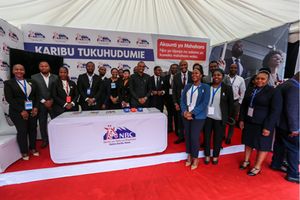OUR KIND OF ENGLISH: PM in drive to boost palm oil ‘cultivation’
What you need to know:
- In the tabloid sister to Bongo’s huge and colourful broadsheet of Sun, Aug 29, there’s this story, ‘Majaliwa tours Kigoma in palm wine oil production drive’ in which Para 5 reads: “The Premier {was} …in a four-day visit to the region devoted to enhancing palm oil CULTIVATION.” No way! You can’t cultivate palm oil, the PM’s backing notwithstanding.
We’ll avoid our usual introductory “lecture” and move straight to the gems we picked up in the recent past, so, here we go…
In the tabloid sister to Bongo’s huge and colourful broadsheet of Sun, Aug 29, there’s this story, ‘Majaliwa tours Kigoma in palm wine oil production drive’ in which Para 5 reads: “The Premier {was} …in a four-day visit to the region devoted to enhancing palm oil CULTIVATION.” No way! You can’t cultivate palm oil, the PM’s backing notwithstanding.
Purporting to report what the Premier said, the scribbler writes in Para 6: “…the government can no longer continue importing COOKING OIL even AS the country has (sic) the capacity to cultivate THE CROP.”
Our colleague seems fully convinced that (cooking) oil is a crop that farmers can cultivate. Nope!
The truth is: farmers cultivate palms, from whose kernels oil is processed—hence the product, PALM OIL. Just like we’ve palm wine, which is brewed (not cultivated) using palm fruit juice.
Here’s our partial rewrite of Para 6: “…the government can no longer continue importing cooking oil even WHEN (not ‘even as’) the country has the capacity to PRODUCE (not cultivate) palm oil.”
Come Fri, Jul 27, and Page 1 of the tabloid closely associated with this columnist has a story entitled ‘Re-establish POAC, Utoh (sic) tells Bunge’.
The scribbler—referring to a book by former controller and auditor general Ludovick Utouh—writes: “This is roughly “ki-Swahili” for ‘Accountability in Inkless Pen.’
Now, why “ki-Swahili” instead of Kiswahili? Yes, and, if you ask us, the East and Central Africa lingua franca shouldn’t even be referred to as “Swahili language” as the scribbler suggests in the same paragraph. It is, simply and proudly, Kiswahili.
On Page 5 of the same tabloid, in a story entitled, ‘Mkapa hospital goes high-tech’, the scribbler writes on the report that the hospital will be undertaking specialised prostate surgeries:
“The NEWS, which might BENEFIT a lot of men…was announced yesterday.” We have a diction issue here, for it cannot be the news that benefits men; the news could only excite them, give them joy and hope (not benefit)!
On Page 27, there’s a story headlined, ‘TPDF allays fears over army vehicles’, and therein the scribbler writes in Para 1:
“The TPDF clarified yesterday about military vehicles, which were seen along (sic) the Mererani tanzanite MINING.”
In showing he knows what he’s talking about, the scribbler writes further in Para 5:
“He assured that there is no operation … at the tanzanite MINING …people should remain calm.”
It’s our belief the information our colleague had at his disposal was that heavy military equipment was seen rolling around the tanzanite MINES (not tanzanite mining).
And finally, purporting to quote a miners’ trade union official, our colleague writes, “We are really shocked after TRUNKS (armoured personnel carriers) ROVE around the wall.”
Military trunks rove? That cannot be! We aver our colleague had in mind “… (military) TANKS that ROLLED (not rove) around the wall.
Ah, this treacherous language called English!




